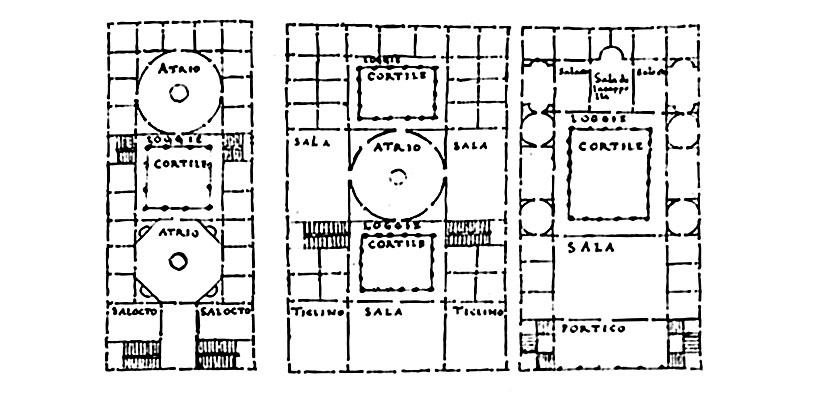
A Seminar series by Pier Vittorio Aureli & Maria Shéhérazade Giudici
Fall Term 2017 Architectural Association, London, PhD Program ‘City/Architecture’
The seminar will focus on a critical history of domestic architecture from its origins to the present. Why we live in houses? Why has this become the predominant way of living? Why has the history of housing always been a history of crisis? Why has domestic space always been a tyrannical place? Why has domestic space always been violent? Francesco di Giorgio Martini, Plans of Gentlemen’s Houses, from the Trattato di Architettura. Why is the real ‘state of exception’ the one that takes place within domestic space? Why does barbarism begins at home? Why within domestic space are we always in debt with something or someone? Why we will never been safe within our homes?
The seminar will attempt to answer these questions.
The house as a specific mode of dwelling originates in part with a desire for stability. As many anthropologists have noted, if there is a fundamental character of the human being, it is his constant feeling of not being at home. For this reason, we can argue that the invention of the house as an architectural apparatus is motivated not only by the need for protection from a hostile territory but also by a desire to settle and to give ritual form to life. A ritual is a set of actions performed according to a prescribed order. Its function is to provide an orientation and continuity on which patterns of behavior can be established and preserved. If for early nomadic societies to live meant to confront extreme environmental conditions, the house offered a way to crystallize a routine against the chronic unpredictability of existence. For this reason, the first forms of housing were also temples where humans and gods were supposed to live together. The ritualization of life fused material existence and spiritual transcendence within the same place, making early forms of domestic space a fixed point within the open-ended space of the natural environment. Once the house became a fixed point, it also became a governmental space that defined specific gender and social roles. This practice demonstrated a desire for occupational rights and the reproduction of social relationships across generations.
As stable form the house inevitably becomes a way to occupy and claim ownership of a place, as well as a space for the care of its members. It is from these premises that the house became oikos and domus. Both words do not refers to house as building but as form of association. The house as oikos is the place of oikonomia, or household management. According to Aristotle the household is made of three kinds of relationships: the despotic relationship between master and slave, the conjugal relationship between husband and wife, and the parental relationship between parent and child. For Aristotle, the defining relationship of the oikos is the despotic relationship between master and slave, wherein the slave’s purpose is to answer the master’s command. What the oikos manages is the reproduction of its members by ensuring the laboring necessary laboring activities necessary to the maintenance of the family: cooking, cleaning, raising kids etc. The seminal paradox of the oikos is that although it is assumed a non-political space, clearly distinct from the political space of the polis, the polis can only exist only through the laboring of the oikos. This paradox is acknowledged by Aristotle himself who devoted the first two book of his Politics to the functioning of the oikos. Reproduction and the maintenance of biological life is thus the foundation of political life, and yet since antiquity domestic labor been hidden and downgraded in the silent and enclosed space of the oikos, excluded from the public visibility of political life. It is precisely the artificial separation between reproduction and politics that is at the origin of the modern distinction of public and private space. With the expulsion of the workspace from the modern dwelling, the latter is rendered as the space of ‘intimate relationships’ the temple of ‘privacy’ and thus as the exclusive domain of the family. In this way reproduction is made a ‘private’ unwaged activity clearly distinct from remunerated work and politics. This phenomenology of the household had a tremendous impact on the history of domestic space, which has been seldom studied systematically in terms of architecture. Following the feminist critique of the household, in the last decade there has been a renewed interest towards the relationship between issues of gender and the architecture of domestic space. Yet this interest has often taken the form of very specific case studies and almost never of a radical reconsideration of what is the very ontological foundation of the idea of home. With this seminar we intend to open a space of radical critique of the idea of domestic space in the form of a history of its making from ancient to contemporary times.
1st session / September 27
10 am – 32 Bedford Square, First Floor, Back
The house and the Ritualization of Life
2nd session / October 11
2.30 pm
The house as Governmental apparatus
3rd session / October 18
2.30 pm
The Oikos
4th session / October 25
2.30 pm
The Domus
5th session / November 1
2.30 pm
The Invention of the Room
6th session / November 8
2.30 pm
Housing and Primitive Accumulation
7th session / November 15
2.30 pm
The Architecture of Well-Tempered Austerity: The Origin of Workers’ Houses
8th session / November 22
2.30 pm
Domestic Labor and the Contemporary House
December 6
10 am
Final Event with Presentations by PhD candidates on Case Studies of Domestic Spaces
ROOMS TBC – check our facebook page for updates



